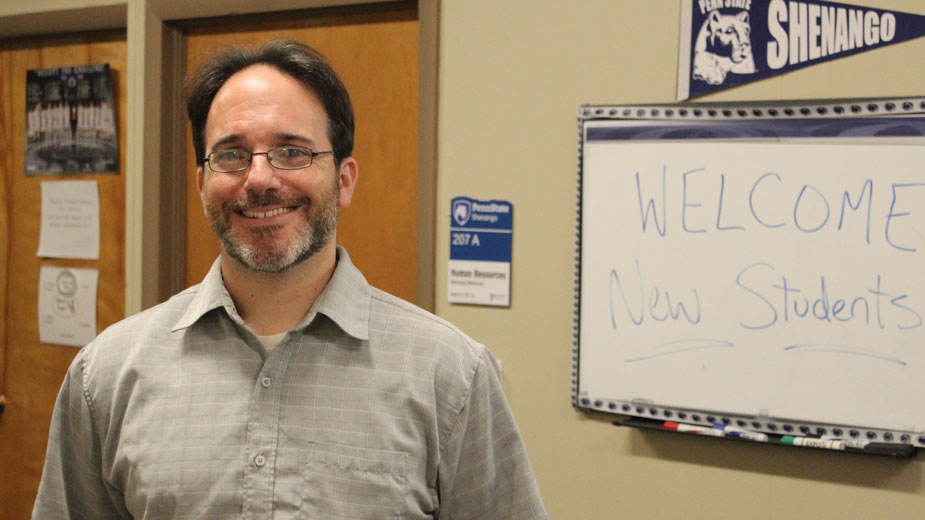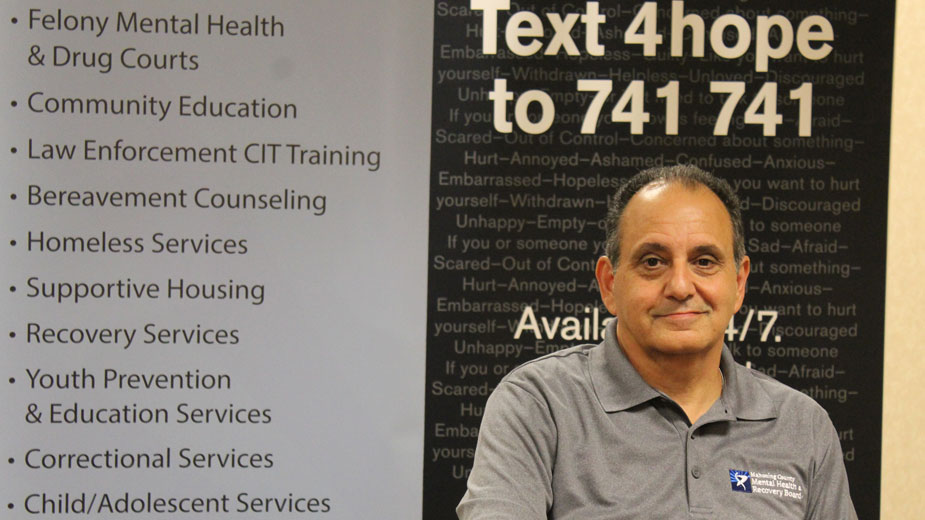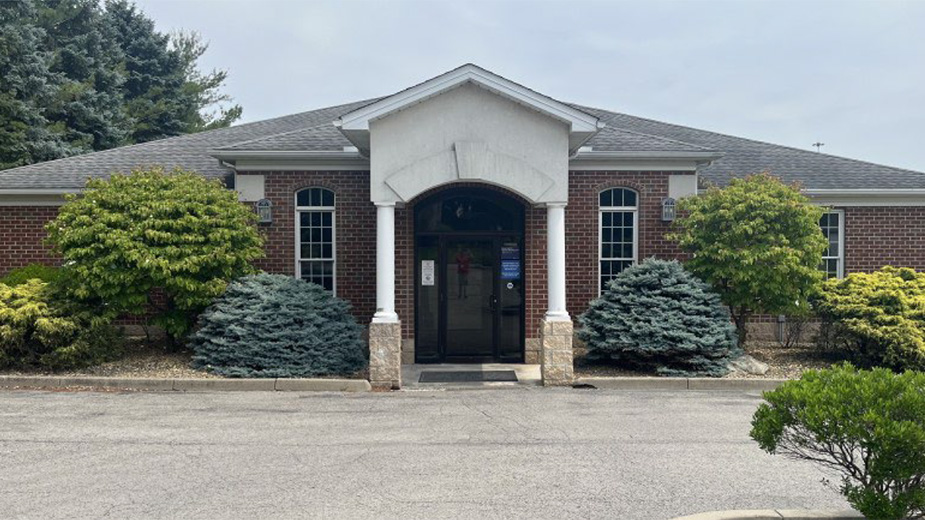‘Asking for Help Isn’t a Weakness’
YOUNGSTOWN, Ohio – With the launch of a public-service announcement campaign in September, the Mahoning County Mental Health & Recovery Board is working to break the stigma that surrounds suicide and communicate to those most likely to kill themselves that seeking help is a sign of strength.
Last year, 32 of the 41 completed suicides in Mahoning County were men, says Duane Piccirilli, executive director of the mental health agency. In Trumbull County, 24 of the 28 completed suicides in 2018 were men, reports the Trumbull County Mental Health & Recovery Board.
“When we’re children, it’s OK for girls to cry but we tell boys not to show their emotions, that it’s a sign of weakness,” Piccirilli says. “It’s a stigma, so they don’t want to share their emotions. Men will hold things inside and because of that, we don’t get the support systems around us.”
Nationwide, suicide is the No. 2 cause of death for people between the ages of 10 and 34, according to the Centers for Disease Control. Both Ohio and Pennsylvania are above the national suicide rate of 14 suicides per 100,000 people; Ohio averages 14.85 and Pennsylvania 15.03. In this area, Mahoning County averages 12.98, Trumbull County 17.12 and Columbiana County 16.78.
As part of National Suicide Prevention Month, the Mahoning County Mental Health & Recovery Board has launched a PSA campaign that features Judges Robert Rusu and John Durkin, Mahoning County Sheriff Jerry Greene, San Francisco 49ers defensive end Solomon Thomas and Ray “Boom Boom” Mancini.
“Asking for help isn’t a weakness,” the champion boxer says in the TV spot. “It’s courageous.”
“We’re hoping,” Piccirilli says, “that if they see people they know or sports figures telling them it’s OK to ask for help, it can start that conversation. I’m hoping we can get more people to come in [for help].”
Among the options – whether an individual is considering suicide or is concerned about someone who is – are Help Hotline at 330 747 2696, the crisis text line at 4HOPE (741741) and the National Suicide Prevention Hotline at 1 800 273 8255.
Mental-health professionals agree that simply getting people to talk about suicide is the first step in breaking the stigma that surrounds it.
The county agencies also refer people to organizations such as Alta Behavioral Healthcare, Valley Counseling Services, Compass Family and Community Services, Meridian Healthcare and Coleman Professional Services.
“There’s a lot to be said for the funding of mental health in this country, but to get people to walk through the doors of mental-health providers’ offices, we have to eliminate the stigma of seeking help,” says Tony Paglia, campus counselor at Penn State Shenango. “We can start young and communicate that these symptoms do exist and it doesn’t mean you’re a bad person or there’s something wrong with you.”

On Sept. 18, Penn State Shenago will host its annual Stamp Out Stigma event, this year featuring Dese’Rae Stage as its keynote speaker. Stage attempted suicide in 2004 and later founded LiveThroughThis.org as a way to provide resources to survivors. As a writer and photographer, she has traveled the country to photograph survivors of suicide attempts and tell their stories.
“We focus on the statistics of those who’ve died by suicide, but there are so many that survive and live their life in shame or silence. They live with that stigma,” Paglia says. “As people who care about others, what can we do to prevent suicide by creating a culture that can talk about this difficult subject?”
For businesses, he encourages the implementation of employee-assistance programs, which offer mental- and behavioral-health counseling services and referrals as part of health-care coverage. In such programs, Paglia says, it’s important to not just offer the service, but stand behind it and encourage employees to take advantage of it.
“The trick isn’t just that the program is set up, but that we promote them and have language behind it that’s supportive,” he says. “There’s the thought a lot of times that you should leave your personal stuff at home; but the fact is you’re a human being and that personal stuff is going to come with you.”
In such programs, adds Alta Behavioral Healthcare mental-health liaison Angela Kearns, it’s also crucial to let employees know that they won’t be treated differently for seeking help.
“People may be worried that it’ll affect their job; but if you screen people without fear of negative consequences, that would have the biggest difference,” she says. “Nobody asks, so they’re not telling anybody. It’s a difficult call to make when it’s an employee … Everybody’s afraid of keeping their jobs, but at least get those resources out and make them prevalent.”
Among the signs of suicidal thoughts to look for are direct and indirect verbal cues – “You won’t have to worry about me pretty soon,” is an example of the latter – and sudden behavioral changes. Rarely is suicide the result of a single high-stress incident. It’s the combination of many stressors and an increasing sense of isolation.
“It’s more of a culmination of life events that leads them to feeling they’ve exhausted every other option,” Paglia says. “It’s important to send the message that being open and talking can help, but more importantly, the community has to listen and be supportive.”
One of the most common misconceptions about suicide is that broaching the topic can seed the idea and push someone to kill himself. Oftentimes, says Ilona Roth-Cohn, associate director of the Trumbull County Mental Health & Recovery Board, someone asking if he’s OK can be the impetus for seeking help.

“We’ve been working hard to make it so it’s not a taboo. It’s OK to talk about it and it’s OK to ask questions,” she continues. “There’s been a push toward that and people are more open to talking about it, as well as depression in general.”
For men specifically, the two county agencies have been referring people to ManTherapy.org for help with all mental health, not just suicide prevention. The campaign deals with issues by using humor and methods that relate specifically to men, Roth-Cohn says.
“Middle-aged men don’t talk. They’re supposed to be strong and have it all together. They’re not supposed to deal with mental health issues,” she says. “[ManTherapy] has all kinds of videos and questions and answers and facts. It’s not just suicide prevention, it’s depression, drugs and alcohol, divorce, kids and financial issues. But it’s all done in a funny way.”
Earlier this year, the Trumbull County agency ran a billboard campaign with ManTherapy and put coasters with the site’s URL and slogans such as “S**t can turn to *s**t when you’re in the s**t” in bars and restaurants. The site saw an uptick in visits from ZIP codes in the county, she reports.
“It spurs people on,” she says. “It’s good to see that people are utilizing information like that.”
Pictured: Mahoning County Mental Health and Recovery Board launched a public service announcement campaign featuring athletes and public officials encouraging men to seek help if they need it, says director Duane Piccirilli.
Copyright 2024 The Business Journal, Youngstown, Ohio.



